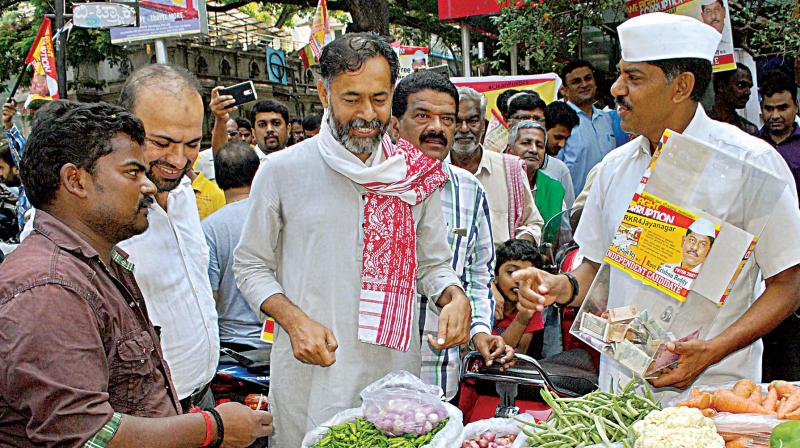Like Hanuman, the farmer doesn't know his own strength
Organisations representing Dalits and farmers arrived en masse to pay their respects here in Bengaluru.

He is the thinker's politician, fiery activist, public intellectual and now politician, all rolled into one. And Yogendra Yadav's Swaraj Abhiyan has begun its journey to history, here in Bengaluru. Since his expulsion from the Aam Aadmi Party, few erring politicians have escaped his scathing insights but Yadav has had far more on his plate than biting rhetoric. The last year has been spent exploring the underbelly of Indian society, bringing to light the problems of the farmers and the marginalised classes.
Organisations representing Dalits and farmers arrived en masse to pay their respects here in Bengaluru, as the Swaraj Party announced its list of six candidates for the Karnataka election. By 8 am on Tuesday morning, Yadav had set out on the three-hour journey by road to Mandya. Here, in the midst of the JD(S) stronghold, they would announce the SI MLA candidates: Linge Gowda from Maddur and Darshan Puttannaiah from Melkote.
"The agrarian nerve centre of Karnataka," he says about Mandya, settling down to a conversation with Deccan Chronicle on the way. "If farmers in this region are committing suicide, then it's a matter of concern.” Yadav, with his year of exploring the agrarian hinterland, has gone from strength to strength with the beleaguered farming community. In February, Yadav's voice rose above the din after the budgetary allocation to agriculture was reduced to 2.36% from 2.38%. He called a nationwide protest of farmers, alleging that the government has fallen short on many a promise.
The farmer crisis in the country is three-pronged, he explains. "It's eocnomic, ecological and existential. It's time the farmer community took a consolidated decision about whether they would like to be driven by politics and politicians, or if they would like to occupy the driver's seat." The analogy is apt: Buckling under debt, stagnant prices and falling budgetary allocations, the farmer community is a troubled lot, vulnerable, in their troubles, to the many vagaries of politics. "Farmers are like God Hanuman," Yadav says. "Like him, they don't understand their own mythical powers."
Over the last four years, Yadav says, the income of farmers has grown by less than 0.5 percent. Despite the rise in production itself, farmers are being paid less for their produce. "They are in rebellion because their suffering is getting worse," says Yadav. "We have prepared a bill which provide farmers with a Minimum Support Price (MS) after taking into account the comprehensive cost of production, a one-time only unconditional loan waver and 50% of the MSP. "Farmers will have a legal claim to this money," remarks Yadav, who believes that the Commission for Agricultural Costs and Prices should be made a statutory body.
Finance Minister Arun Jaitley promised farmers A2 + FL (definition of farm production costs fixed by the CACP), which would only cover the partial cost of production and doesn't include the imputed costs of land and capital. "This works out to some Rs 1,250 per quintal," says Yadav.
Swaraj has also prepared a bill of its own, based on the Swaminathan Committee Report. "By our calculation, the farmer will receive Rs 1,900 per quintal. M.K. Swaminathan, the leader of the Green Revolution, believed in margin over comprehensive cost. The legal clause is very important and has been ignored by the NDA," Yadav explains.
All this makes the Mandya visit that much more crucial. "Farmers' struggles and movements are going to be the driving forces in future politics," he says. "If farmers from two districts in Maharashtra could cripple Mumbai, imagine the consequences of farmers across the country getting together."
"The unity of farmers, both landed and tenanted, he says, is the foundation of progress."

